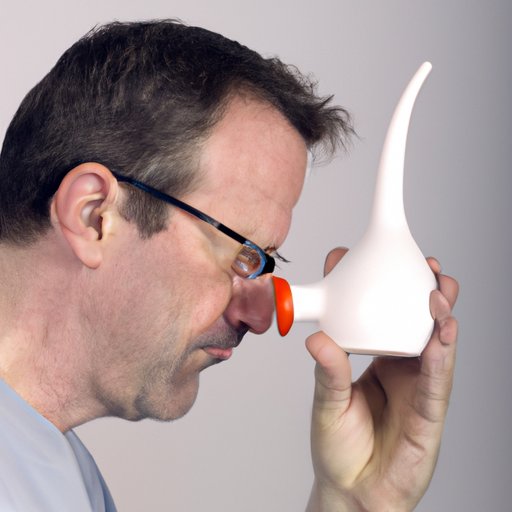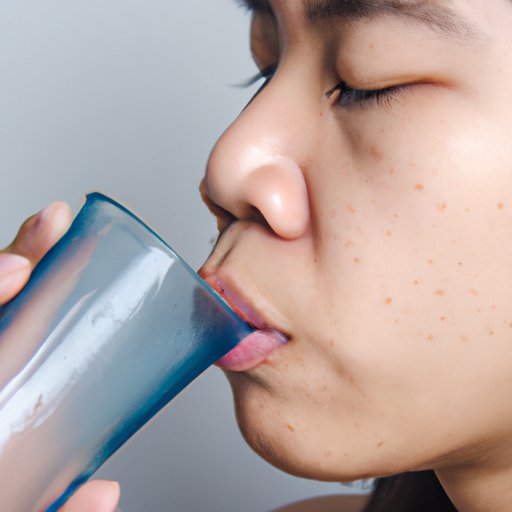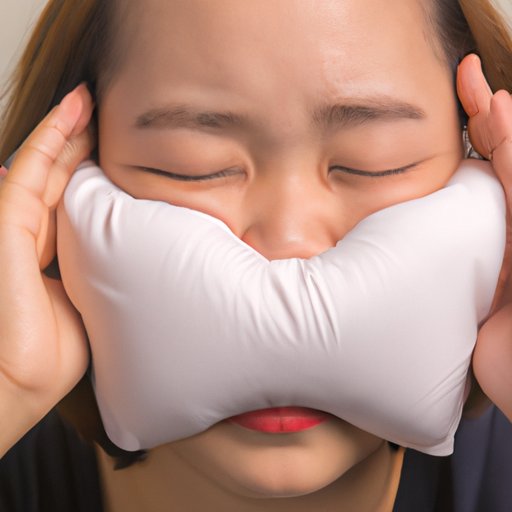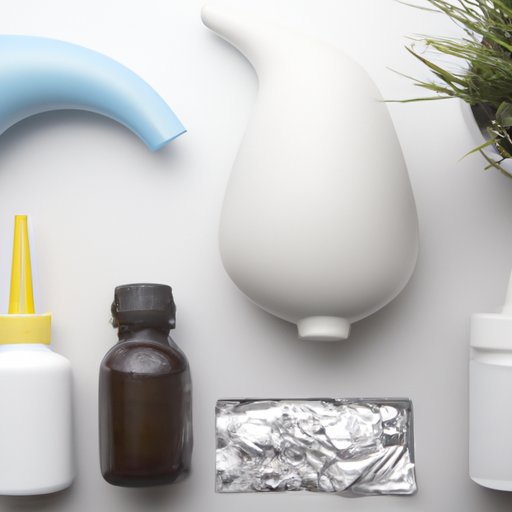Introduction
Sinusitis, commonly known as sinus, is an inflammation or infection of the sinuses. It is caused by bacteria, viruses, or fungi. Common symptoms include congestion, facial pain and pressure, headaches, thick yellow or green mucus, fever, bad breath, fatigue, and coughing. If left untreated, chronic sinus can lead to serious complications such as meningitis or brain abscess. Fortunately, there are several ways to take care of sinus at home.

Use a Neti Pot to Clear Out Your Sinuses
A neti pot is a device used to flush out your nasal passages. It can help clear out mucus and debris from your sinuses, reducing congestion and relieving sinus pressure. When using a neti pot, it is important to use distilled, sterile, or previously boiled water to avoid introducing bacteria, viruses, or other contaminants into your nasal passage.
Benefits of Using a Neti Pot
Using a neti pot can provide many benefits. It can help reduce inflammation in the nasal passages, improve breathing, and offer relief from sinus pressure. It can also help remove allergens and other irritants from your sinuses, reducing the risk of developing allergies or asthma.
Instructions on How to Use a Neti Pot
To use a neti pot, first fill it with lukewarm distilled, sterile, or previously boiled water. Add 1 teaspoon of salt and stir until dissolved. Lean over the sink and tilt your head to one side so that the spout of the neti pot is in your top nostril. Slowly pour the solution into your nostril while keeping your mouth open. Allow the solution to flow through your nasal passages and out the other nostril. Blow your nose to clear out any remaining liquid. Repeat on the other side.

Drink Plenty of Fluids to Thin Mucus and Keep the Nasal Passages Moist
Drinking plenty of fluids can help thin out mucus and keep your nasal passages moist. This helps reduce congestion, making it easier to breathe. Water is the best choice for hydration, but you can also drink tea, juice, or other fluids. Avoid sugary drinks or caffeine, as they can make dehydration worse.
Benefits of Drinking Fluids
Drinking fluids can provide many benefits. It can help thin out mucus, making it easier to expel. It can also help keep the nasal passages moist, reducing congestion and improving breathing. Drinking fluids can also help replenish lost electrolytes, which are essential for maintaining good health.
Recommended Amount of Fluids to Drink
It is recommended to drink at least 8 glasses of fluids a day when suffering from sinus. You may need to drink more if you are sweating excessively due to fever or other activities. It is also important to avoid overhydration, as it can cause nausea, vomiting, and other uncomfortable symptoms.

Apply a Warm Compress to Your Face to Reduce Sinus Pressure
Applying a warm compress to your face can help reduce sinus pressure and relieve congestion. The heat helps to open up the nasal passages, making it easier to breathe. It can also help reduce inflammation, making it easier to expel mucus.
Benefits of Applying a Warm Compress
Applying a warm compress can provide many benefits. It can help reduce sinus pressure, making it easier to breathe. It can also help reduce inflammation in the nasal passages, making it easier to expel mucus. The warmth can also help relax muscles, providing relief from headaches and other facial pains.
Instructions on How to Apply a Warm Compress
To apply a warm compress, first wet a clean cloth with warm water. Wring out the excess water and place the cloth over your face. Leave it on for 10 to 15 minutes. Repeat as needed. Make sure the compress is not too hot, as it can cause burns.
Try Steam Inhalation to Open Clogged Nasal Passages
Steam inhalation can help open clogged nasal passages and reduce congestion. The warm, moist air helps to thin out mucus, making it easier to expel. It can also help reduce inflammation, making it easier to breathe.
Benefits of Steam Inhalation
Steam inhalation can provide many benefits. It can help open clogged nasal passages, making it easier to breathe. It can also help thin out mucus, making it easier to expel. The warmth and moisture can also help relax muscles, providing relief from headaches and other facial pains.
Instructions on How to Do Steam Inhalation
To do steam inhalation, bring a pot of water to a boil. Remove the pot from the heat and add a few drops of essential oil, if desired. Drape a towel over your head and lean over the pot. Close your eyes and inhale the steam for 10 to 15 minutes. Repeat as needed.
Take Over-the-Counter Decongestants or Antihistamines to Reduce Inflammation
Over-the-counter decongestants and antihistamines can help reduce inflammation in the nasal passages, making it easier to breathe. They can also help reduce sinus pressure and reduce the production of mucus. However, it is important to follow the instructions on the label and consult your doctor before taking any medication.
Benefits of Taking Decongestants or Antihistamines
Taking decongestants or antihistamines can provide many benefits. They can help reduce inflammation in the nasal passages, making it easier to breathe. They can also help reduce sinus pressure and reduce the production of mucus. Additionally, they can help reduce allergy symptoms, such as sneezing and itchy eyes.
Precautions for Taking Over-the-Counter Medications
When taking over-the-counter medications, it is important to follow the instructions on the label. Some medications can cause drowsiness, so it is important to avoid operating machinery or driving while taking them. It is also important to consult your doctor before taking any medication, especially if you are pregnant or breastfeeding.
Avoid Irritants Such as Smoke, Dust, and Pollen That Can Trigger Sinus Symptoms
Certain environmental irritants, such as smoke, dust, and pollen, can trigger sinus symptoms. Exposure to these irritants can cause inflammation in the nasal passages, making it harder to breathe. To reduce your exposure to these irritants, it is important to avoid them as much as possible.
Explanation of Irritants
Irritants are substances that can cause inflammation in the nasal passages when inhaled. Common irritants include smoke, dust, mold, pet dander, and pollen. These irritants can trigger sinus symptoms, such as congestion, headaches, and fatigue.
Tips on How to Avoid These Irritants
To reduce your exposure to these irritants, it is important to keep your home and work environment clean. Vacuum regularly and use an air purifier to remove dust and other particles from the air. Avoid smoking or being around people who smoke. Wear a mask when outdoors to reduce your exposure to pollen and other irritants.
Conclusion
There are several ways to take care of sinus at home. Using a neti pot, drinking plenty of fluids, applying a warm compress, trying steam inhalation, taking over-the-counter decongestants or antihistamines, and avoiding irritants can all help reduce sinus symptoms. However, if your symptoms persist, it is important to seek medical help.
(Note: Is this article not meeting your expectations? Do you have knowledge or insights to share? Unlock new opportunities and expand your reach by joining our authors team. Click Registration to join us and share your expertise with our readers.)
